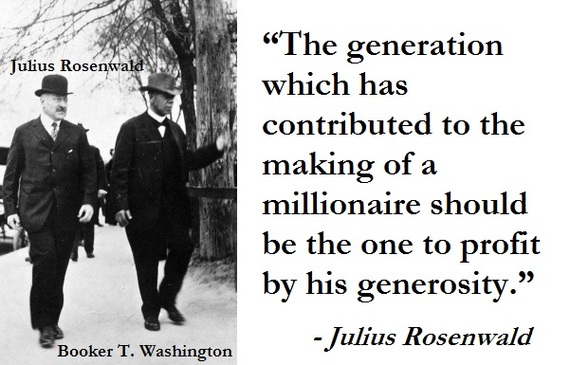Give thanks. Get bargains. Give back.
In recent years, a new financial trifecta has emerged following Thanksgiving. First, Black Friday. Next, Cyber Monday. And third, #GivingTuesday.
Here's the official definition:
On Tuesday, December 2, 2014, charities, families, businesses, community centers, and students around the world will come together for one common purpose: to celebrate generosity and to give. It's a simple idea. Just find a way for your family, your community, your company or your organization to come together to give something more.
I like the idea that conspicuous consumption can give way to conspicuous compassion. So, with hopes it may inspire some readers, I'd like to share a true story that exemplifies the idea of giving while living.
Julius Rosenwald was a co-founder of Sears, Roebuck & Company. He created a foundation with his wealth and stipulated that all the funds be spent within 25 years of his death; the Foundation closed in 1948, having granted $63 million.
Mr. Rosenwald founded Chicago's Museum of Science and Industry. He endowed the Tuskegee Institute and served on its board for 20 years, working closely with Booker T. Washington. In the American South, he showed innovation by using $4 million as matching funds to support the building of more than 5,300 schools and teachers' homes.
But while his contemporaries Andrew Carnegie and John D. Rockefeller were building foundations that would limit giving to establish endowments in perpetuity, Mr. Rosenwald insisted that "the generation which has contributed to the making of a millionaire should be the one to profit by his generosity."
A sense of pressing immediate needs also drove his decision to reject the perpetuity model. He expressed his philosophy this way:
Permanent endowment tends to lessen the amount available for immediate needs; and our immediate needs are too plain and too urgent to allow us to do the work of future generations.
By 1932, a remarkable 35 percent of all black children in the South received an education in a Rosenwald school.
Julius Rosenwald died that same year with the knowledge that his "giving while living" had made a significant difference to his own generation.
FOR MORE: Setting a Time Horizon - How Long Should Your Foundation or Giving Program Last? - a donor guide published by Rockefeller Philanthropy Advisors
Cross-posted on Noozhawk.

